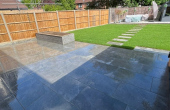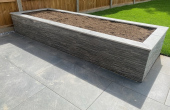Telephone: 0118 229 2486
Home›News›Your Questions Answered: Common Landscaping Queries from Berkshire Homeowners.
Your Questions Answered: Common Landscaping Queries from Berkshire Homeowners.
In the picturesque county of Berkshire, homeowners often find themselves with questions and curiosities when it comes to landscaping their gardens. At Daniel Moquet UK, we understand that embarking on a landscaping project can be both exciting and daunting. That's why we've compiled this comprehensive guide to answer the most common landscaping queries that Berkshire homeowners may have.
Our aim is to provide you with a wealth of knowledge and insights to help you make informed decisions for your landscaping needs. Whether you're considering a complete garden transformation, looking to add some hard landscaping elements, or just seeking clarity on the process, we're here to guide you through it all.
Now, let's delve into the world of hard landscaping and address your first set of questions.
Understanding Hard Landscaping
What is Hard Landscaping?
Hard landscaping refers to the non-living, structural elements of a garden or outdoor space. These elements are designed to provide functionality, organisation, and aesthetic appeal to your landscape. Common hard landscaping features include pathways, driveways, patios, walls, fencing, decking, and water features.
Unlike soft landscaping, which involves living elements such as plants, trees, and grass, hard landscaping focuses on hardscapes or permanent fixtures. It lays the foundation for the overall design of your outdoor space and often requires careful planning and expertise.
The Difference Between Hard Landscaping and Soft Landscaping
To create a balanced and harmonious outdoor environment, it's essential to understand the distinction between hard and soft landscaping.
Hard Landscaping:
Involves non-living elements.
Provides structure and organisation.
Typically includes paths, walls, and features like pergolas.
Requires expertise in construction and design.
Soft Landscaping:
Involves living elements, such as plants and trees.
Adds natural beauty and colour to the space.
Includes elements like flowerbeds, lawns, and shrubs.
Requires horticultural knowledge for plant selection and care.
Balancing these two components is key to creating a garden that not only looks beautiful but also functions well for your needs. As we proceed, we'll explore how to strike that balance effectively.
Planning and Design
The Role of a Garden Designer in Landscaping
When considering a landscaping project, you may wonder whether you need both a garden designer and a landscaper. While the roles can overlap, they serve distinct purposes in the landscaping process.
A garden designer:
Specialises in the creative aspect of landscaping.
Focuses on the overall layout, aesthetics, and functionality of the garden.
Works with you to conceptualise your vision and create detailed plans.
A landscaper:
Executes the physical work required to bring the design to life.
Handles tasks like excavation, paving, and construction.
Collaborates with the designer to ensure the project aligns with the vision.
In many cases, it's beneficial to have a garden designer translate your ideas into a comprehensive plan before bringing in a landscaper to execute it. This ensures that the end result meets your expectations in terms of both aesthetics and functionality.
Why You Need a Professional Landscaper
Partnering with a professional landscaper is essential for a successful landscaping project. Here are some reasons why:
Expertise: Professional landscapers have the knowledge and experience to handle complex projects, ensuring quality and durability.
Time Efficiency: They can complete the project efficiently, saving you time and effort.
Resources: Landscapers have access to the necessary tools, equipment, and materials for the job.
Customisation: A skilled landscaper can tailor the project to your specific needs and preferences.
Now that you understand the roles of garden designers and landscapers, let's move on to the next section, where we'll discuss the costs associated with hard landscaping.
Costs of Hard Landscaping
Factors Influencing Landscaping Costs
The cost of hard landscaping can vary significantly depending on several factors. It's crucial to have a clear understanding of these elements to budget effectively for your project. Here are the main factors influencing landscaping costs:
Project Size and Complexity: Larger and more intricate projects typically require more time, materials, and labour, resulting in higher costs.
Choice of Materials: The type and quality of materials you choose for your hard landscaping features can significantly impact the overall cost. Premium materials may come with a higher price tag.
Labour Costs: Skilled labour is essential for proper installation. Labour costs can vary based on location and the complexity of the project.
Design Complexity: Elaborate designs with intricate patterns or detailing may require more time and expertise, affecting the overall cost.
Site Preparation: If your garden requires extensive site preparation, such as excavation or soil conditioning, this will add to the costs.
Additional Features: Extras like lighting, irrigation systems, or decorative elements can increase expenses.
Budgeting for Hard Landscaping Elements
To budget effectively for your hard landscaping project:
Set Priorities: Determine which elements are most important to you and allocate your budget accordingly.
Request Quotes: Contact reputable landscaping companies like Daniel Moquet UK to provide detailed quotes for your specific project.
Plan for Contingencies: Include a contingency fund in your budget to account for unexpected expenses or changes during the project.
Consider Long-Term Costs: While initial costs are important, also think about the long-term maintenance and durability of materials and features.
By understanding these cost factors and following these budgeting tips, you can make informed decisions and ensure that your landscaping project aligns with your financial expectations.
Execution of Hard Landscaping Projects
Timelines for Garden Transformation
The timeline for transforming your garden through hard landscaping depends on various factors, including project complexity and the weather. While smaller projects like installing a patio or a garden path may take a few weeks, more extensive transformations can span several months. It's essential to discuss the timeline with your chosen landscaper to set realistic expectations.
Understanding Planning Permission Requirements
In Berkshire, certain hard landscaping projects may require planning permission. Factors such as the size, location, and purpose of the project can influence whether permission is needed. To ensure compliance, consult with your local council who can guide you through the process.
The Hard Landscaping Quotation Process
When you request a quotation for your hard landscaping project, you can expect a thorough assessment from a reputable landscaping company like Daniel Moquet UK. The process typically involves:
Site Visit: A representative from the landscaping company will visit your property to assess the site, discuss your requirements, and take measurements.
Detailed Quote: You'll receive a detailed quotation that outlines the scope of work, materials to be used, and any additional services.
Timeline: The quotation will include an estimated timeline for the project's completion.
Questions and Clarifications: You can ask any questions and seek clarification regarding the quotation.
Reviewing Plans Before Project Commencement
It's crucial to review and approve the project plans before the landscaping work begins. This allows you to ensure that the design aligns with your vision and expectations. Reputable landscaping companies will involve you in this process, making any necessary adjustments based on your feedback.
Addressing Issues During the Project
During the hard landscaping project, unexpected issues can arise. This might include encountering unforeseen obstacles in the soil, changes in design preferences, or weather-related delays. Effective communication with your landscaper is key to resolving these issues promptly and keeping the project on track.
Materials and Maintenance
Common Materials Used in Hard Landscaping
Hard landscaping features can be crafted from a wide range of materials, each offering its unique benefits and aesthetics. Here are some of the common materials used in hard landscaping:
Paving Stones: Durable and versatile, paving stones come in various colours and textures, making them ideal for patios and pathways.
Concrete: Cost-effective and available in different finishes, concrete is commonly used for driveways and decorative elements.
Natural Stone: Offers a timeless and natural look. Options include sandstone, limestone, and granite, which are used for patios, walls, and paths.
Brick: Bricks add a classic touch to landscaping. They can be used for pathways, walls, and even driveways.
Timber: Timber is often chosen for decking, pergolas, and retaining walls due to its warm and rustic appeal.
Gravel: Ideal for pathways and driveways, gravel comes in various sizes and colours and provides good drainage.
Composite Materials: Modern alternatives like composite decking offer durability and low maintenance.
Choosing the Right Materials for Specific Features
Selecting the right materials for your hard landscaping features is crucial for achieving the desired look and functionality. Consider the following when making your choices:
Aesthetics: Think about the overall style and aesthetic you want to achieve in your garden. Some materials lend themselves better to traditional designs, while others suit contemporary or rustic settings.
Durability: Assess the durability of materials in your local climate. Some materials may require more maintenance or may not withstand harsh weather conditions.
Maintenance: Consider your willingness and ability to maintain the materials. Some options, like natural stone, may require sealing and periodic cleaning, while others, like composite materials, are low maintenance.
Budget: Ensure that the chosen materials fit within your budget. Keep in mind that higher-quality materials may have a higher initial cost but can offer long-term savings through reduced maintenance.
Compatibility: Ensure that the materials you choose are compatible with the overall design and function of your outdoor space.
By carefully evaluating these factors and consulting with professionals, you can make informed decisions regarding the materials for your hard landscaping features.
Special Considerations for Hard Landscaping
Regulatory and Council Permissions
Depending on the nature of your hard landscaping project, you may need to obtain regulatory approvals or council permissions. It's essential to research local regulations and consult with your local council to ensure compliance. Common considerations include:
Building permits for structural elements.
Restrictions on the height or location of certain features.
Environmental impact assessments for large-scale projects.
Environmental Sustainability in Landscaping
As environmental awareness grows, many homeowners are seeking sustainable landscaping solutions. Here are some ways to ensure that your hard landscaping projects are environmentally friendly:
Material Selection: Choose eco-friendly and sustainable materials whenever possible. Consider recycled or reclaimed materials.
Water Management: Incorporate efficient irrigation systems to minimise water wastage and use native plants that require less water.
Permeable Surfaces: Opt for permeable paving or surfaces that allow rainwater to seep into the ground, reducing runoff.
Wildlife Habitats: Design your landscaping to create habitats for local wildlife, such as bird-friendly plants or pond features.
Low-Impact Construction: Work with landscapers who employ practices that minimise disturbance to the ecosystem during construction.
Sustainable Lighting: Use energy-efficient lighting options for outdoor spaces.
By prioritising sustainability in your hard landscaping projects, you can create a beautiful outdoor environment while minimising your ecological footprint.
Hiring Professionals for Hard Landscaping
Qualities to Seek in a Professional Landscaping Company
Choosing the right landscaping company is critical for the success of your project. Look for the following qualities when hiring professionals:
Experience: Check the company's track record and ask for references to assess their experience and expertise.
Reputation: Read reviews and seek recommendations from friends or neighbours who have had similar work done.
Licenses and Insurance: Ensure the company is properly licensed and carries insurance to protect you and your property.
Portfolio: Review their portfolio to see if their style aligns with your vision.
Communication: Effective communication is essential. Choose a company that listens to your ideas and provides clear, detailed proposals.
Verifying Credentials and Reputation
Before finalising your decision, verify the company's credentials, request a detailed written contract, and discuss timelines and payment schedules. A reputable company will be transparent and professional throughout the process.
In conclusion, embarking on a hard landscaping project in Berkshire can transform your outdoor space into a functional and visually appealing oasis. By understanding the key aspects of hard landscaping, such as materials, costs, and sustainability, you can make informed decisions and create a garden that enhances your lifestyle and adds value to your property.
If you have any further questions or require assistance with your landscaping project, don't hesitate to reach out to Daniel Moquet UK. We're here to provide you with the expertise and guidance you need to bring your landscaping vision to life.









 Over 40 years of experience working collectively
Over 40 years of experience working collectively A 'Quality Service Guarantee'
A 'Quality Service Guarantee' Premium industry-leading products
Premium industry-leading products